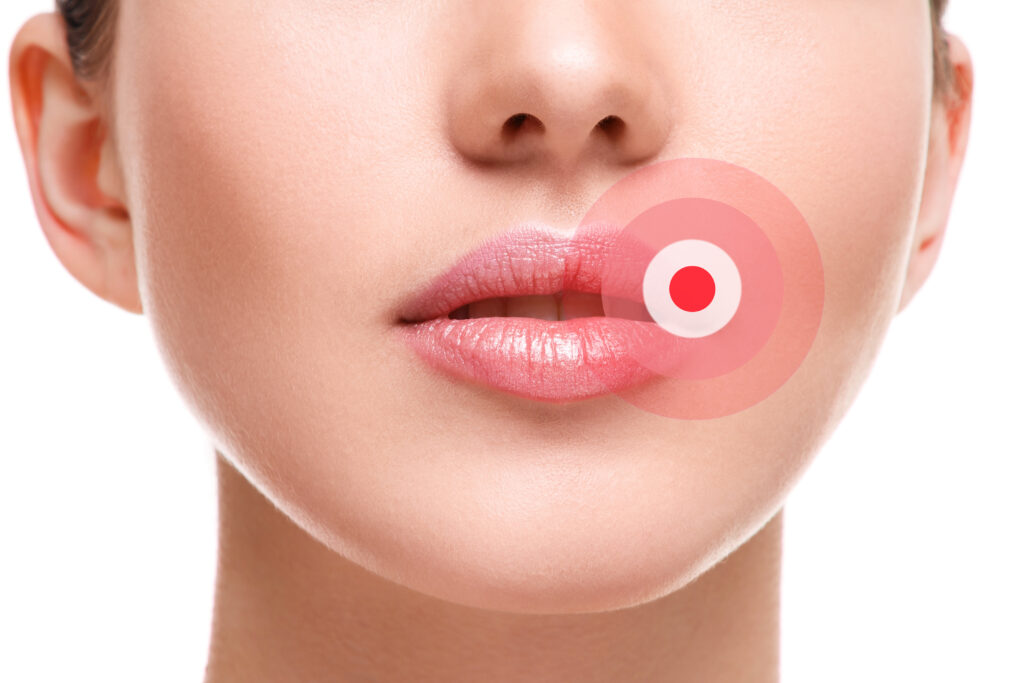Cold Sores FAQ's

Cold sores are a common viral infection usually caused by the herpes simplex virus type 1 (HSV-1). They are small, fluid filled blisters on and around the lips. The blisters are usually grouped together in patches. When the blisters break a scab forms in their place which can last several days. Cold sores usually heal in two or three weeks without scarring.
What are the symptoms of Cold Sores (HSV-1)?
Cold sores (HSV-1) usually present around the mouth and lips. The usually pass through three stages.
- Tingling and hypersensitivity – Approximately two days before the blisters form, many people experience a tingling, burning or hypersensitivity around the lips.
- Blisters – Small, fluid-filled blisters often form along the edges of the lips. Sometimes they can appear in other areas such as inside the nostrils or inside of the mouth.
Leaking and Scabbing – The small blisters will burst after a few days, leaving open sores which will scab over.
How common are Cold Sores (HSV-1)?
How do I catch Cold Sores (HSV-1)?
When are Cold Sores (HSV-1) most contagious?
Is there a cure for Cold Sores (HSV-1)?
What medications do you offer for Cold Sores (HSV-1)?
What is Valacyclovir?
Valacyclovir belongs to a group of medications called anti-virals. Valacyclovir helps stop the growth of certain viruses. Valacyclovir decreases the severity and length of these outbreaks and enables the sores to heal more quickly. It also can reduce pain and discomfort. Taking valacyclovir can also reduce the transmission of cold sores to others. It works best when the amount of medicine in your body is kept at a constant level.
What is my dose of Valacyclovir?
What are the side effects of Valacyclovir?
Lots of medications can cause side effects, which is an unwanted response to a medication when taken as a normal dose. Not all people experience side effects. The following side effects have been reported by at least 1% of people when using Valacyclovir.
- Nausea and vomiting
- Diarrhoea
- Headache
- Dizziness
- Photosensitivity reaction
- Skin reactions
Check with your Doctor (and discontinue medication) as soon as possible if any of the following less common side effects occur:
- Abdominal Discomfort
- Agitation, confusion, hallucinations or excessively drowsy.
- Blood in urine
- Signs of bleeding (e.g., unusual bruising or bleeding, unexplained nosebleeds)
- Kidney pains (pain in the side between lower ribs and hip)
- Tremors
- Low white blood cells (Leucopoenia) or Low platelet levels (thrombocytopenia)
- Sign of decreased kidney function (e.g., decreased urine output, nausea, reduced appetite).
SEEK IMMEDIATE MEDICAL ATTENTION IF ANY OF THE FOLLOWING SIDE EFFECTS OCCUR AND DISCONTINUE TAKING THE MEDICATION
- Chest pains, irregular heartbeat, shortness of breath
- Shortness of breath associated with a blue colouring of the lips and peripheries (hands and feet)
- Severe Allergic reaction or anaphylaxis (swelling, facial swelling, swelling of lips, tongue, throat, shortness of breath, wheeze, rash, itching)
- Severe skin reaction (blistering, skin peeling, an extensive rash or rash accompanied by fever or pain)
PLEASE ENSURE YOU READ THE PATIENT INFORMATION LEAFLET THOROUGHLY WHICH WILL BE DELIVERED WITH YOUR MEDICATION BEFORE TAKING ANY MEDICATION PRESCRIBED BY US
What is Acyclovir?
Acyclovir belongs to a group of medications called anti-virals. Topical acyclovir is offered as a PRESCRIPTION ONLY medicine by QuickDoc to treat the symptoms of cold sores (HSV-1). It may help to relieve the pain and discomfort associated with the cold sores and help them heal faster.
What is my dose of Acyclovir?
What are the side effects of topical Acyclovir?
Lots of medications can cause side effects, which is an unwanted response to a medication when taken as a normal dose. Not all people experience side effects. The following side effects have been reported as uncommon, by less than 1% of people when using topical acyclovir.
- Burning or stinging for a short time after applying the topical medication
- Localised skin reactions
SEEK IMMEDIATE MEDICAL ATTENTION IF ANY OF THE FOLLOWING SIDE EFFECTS OCCUR AND DISCONTINUE TAKING THE MEDATION
- Chest pains, irregular heartbeat, shortness of breath
- Shortness of breath associated with a blue colouring of the lips and peripheries (hands and feet)
- Severe Allergic reaction or anaphylaxis (swelling, facial swelling, swelling of lips, tongue, throat, shortness of breath, wheeze, rash, itching)
- Severe skin reaction (blistering, skin peeling, an extensive rash or rash accompanied by fever or pain)
PLEASE ENSURE YOU READ THE PATIENT INFORMATION LEAFLET THOROUGHLY WHICH WILL BE DELIVERED WITH YOUR MEDICATION BEFORE TAKING ANY MEDICATION PRESCRIBED BY US
SOME PEOPLE MAY EXPERIENCE SIDE EFFECTS WHICH ARE NOT LISTED HERE. PLEASE CHECK WITH OUR TEAM OR PHARMACY TEAM THROUGH YOUR CLIENT DASHBOARD IF YOU NOTICE A SIDE-EFFECT WHICH CONCERNS YOU WHILE TAKING ACYCLOVIR
QUICK. SAFE. EFFICIENT. THAT’S QUICKDOC.
For a Better Healthcare Experience.
Patient Centred and endorsed by our in-house Doctors.
QuickDoc is revolutionising healthcare in Canada with safe and ethical prescription generation and medication that can also be delivered straight to your door.
